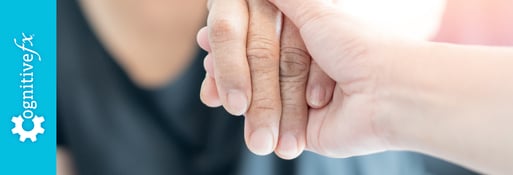To protect our patient’s privacy, we’ve changed her name and omitted identifying details. Her story and testimonial remain unchanged.
For nearly a decade, Sarah lived with severe depression. Diagnosed in her first year of college, she now believes it began two years earlier—back in high school.
“I thought I was just having a bad year,” she remembers. “But by freshman year, I realized I had a mental illness.”
What followed was nine years of doing everything right—and still feeling like nothing worked. She sought therapy, took antidepressant medications (sometimes multiple meds at a time), made lifestyle changes, and leaned on her loved ones. She stayed active, ate well, and kept up with her responsibilities. On the outside, she maintained a high GPA and appeared to have it all together. On the inside, she was barely holding on.
“I was doing all the things that you were supposed to be doing, but my depression symptoms just got worse and worse. It got to a point where it felt like a physical presence. I would turn around and be like, there’s something there, but of course, there was nothing there. There was this cloud I couldn’t shake. Getting out of bed felt like trying to move with a load of bricks on my back. I was just permanently exhausted.”
Eventually, the depression escalated to a suicide attempt. “The thoughts were constant,” she says. “I know some people shut down when they’re depressed, but I just kept pushing on through everything.”
A Glimmer of Hope: Her Initial TMS Experience
A few years later, Sarah tried traditional rTMS therapy (repetitive transcranial magnetic stimulation or rTMS). It didn’t bring her out of depression, but it was the first thing that gave her the tiniest foothold.
“Out of everything I tried, it was the one thing that gave me a fingerhold on reality. It wasn’t life-changing—I was still in a very poor mental state—but it was the one thing that finally got a foot in the door.”
So when she heard about Accelerated fMRI-Intermittent Theta Burst TMS therapy at Cognitive FX—a more personalized, advanced version of TMS—she didn’t hesitate.
“I had nothing to lose. I’d tried everything. And the fact that they used fMRI to tailor the treatment to my brain made a huge difference. Traditional TMS felt like a shot in the dark. This felt precise.”
Life After Accelerated fMRI-TMS at Cognitive FX
The change didn’t happen overnight. In the first few weeks after treatment, Sarah feared it hadn’t worked. But then something shifted.
“I suddenly realized I hadn’t felt that cloud in days. Smiling was easier. Laughing was easier. It just crept up on me—and then it felt like the sun just broke through.”
Unlike medication, which helped her manage the day-to-day but didn’t prevent emotional crashes, Accelerated fMRI TMS gave her something she hadn’t experienced in years: relief that persisted.
“I went five months without a single depressive crash. That was monumental for me.”
During those months, life still had its challenges—but her responses felt normal. Manageable. Not like the end of the world. “For the first time in ten years, I feel like I’m thriving, I love myself—and I love life again.”
What Happened When the Depression Returned
In January, about five months after treatment, Sarah experienced a few life events where she noticed her emotional response started to feel disproportionately intense. “I had four crashes that month, and it scared me. I thought, ‘Is it coming back?’”
She reached out to the team at Cognitive FX. They recommended a booster treatment—a shorter, three-day version of her original five-day protocol. The team administered eight sessions of 6-minute treatment over the course of three mornings.
Just like before, the effects took time to kick in. And just like before, they did.
“After a couple weeks, I felt that reset again. It went back to, yeah, life’s still hard, but it’s regular life hard. It’s not the end of the world when things happen. And again, I don’t have that depressive cloud over me.”
What It’s Like to Receive fMRI-TMS Treatment
Describing the sensation of TMS, Sarah says it’s not exactly pleasant—but it’s definitely tolerable, and for her it was worth it.
“At its mildest, it feels like someone flicking your head. At one point early on, I had a funny reaction where I would feel a really hard zap behind my eye. So I told the staff it really didn’t feel good, and they adjusted the angle of the machine for me. As soon as they did that, the discomfort was still there, but it was much more manageable.”
“What I really liked was, as soon as they shifted the angle, they were able to save where that position was so we didn’t have to experiment every single time moving forward.”
“The staff there was super friendly, super nice, and very responsive whenever I felt like I had an issue, or I needed to reschedule something. Any concerns or questions I had, they explained to me in detail what was happening.”
The treatment involves a snug headband with a marker that helps the machine precisely locate the treatment area. After multiple sessions a day, the pressure became slightly uncomfortable, but even that was adjustable. “For my booster round, I asked them to loosen it a little, and that helped a lot.”
The other side effect she experienced was short-lived headaches, likely from the sound and physical sensation of the magnetic pulses, but they always resolved quickly.
Care Beyond the Chair
During her treatment week, Sarah met multiple times with Dr. Spangler, the clinical psychologist on staff. Though she had a long history of therapy that left her wary, she found the sessions surprisingly helpful.
“I’ve been through so many therapists, I almost have a trauma response to therapy. But Dr. Spangler helped normalize everything. She was clinical but compassionate. It helped me process everything I was going through.”
Sarah also participated in brief cardio sessions on a treadmill with the clinic’s physical therapy team—a component designed to support brain plasticity and break up the day. “As an active person, I loved it. And it gave me something to do between treatments.”
Her only regret? “I wish I’d done more of the massage sessions they offered. That was a nice surprise.”
Why She’s Telling Her TMS Patient Story
Sarah chose to share her experience for two reasons: to express gratitude to the team at Cognitive FX, and to advocate for broader access to Accelerated TMS.
“This treatment was so effective for me that I want it to be available for anyone who needs it.”
What Makes TMS Treatment Different at Cognitive FX?
Most clinics offering TMS use a standard protocol called repetitive transcranial magnetic stimulation (rTMS). While rTMS is FDA-approved and can help with depression, it uses a one-size-fits-all targeting method that does not account for individual variations in head size, shape, and brain structure, which can significantly impact treatment outcomes. Missing the TMS target site by a few millimeters can reduce the effectiveness of TMS treatment.
In addition, repetitive TMS is administered with daily sessions, 5 days per week, over 4 to 6 weeks. This lengthy and demanding treatment schedule is often difficult for patients to complete amidst work, childcare, and other life commitments.
In contrast, our accelerated, fMRI-guided TMS protocol solves these issues. We offer:
1. Personalized Targeting with fMRI
Instead of relying on anatomical averages, we use functional magnetic resonance imaging (fMRI) to map each patient’s brain activity before treatment begins.
This brain mapping allows us to pinpoint the exact target location for treatment—the left dorsolateral prefrontal cortex or L-DLPFC—ensuring stimulation is delivered where it will have the greatest impact.
2. Precision Coil Placement for Every Treatment Session
We use advanced neuronavigation systems approved by the FDA to ensure accurate coil positioning for every treatment session. This real-time guidance system ensures consistent, effective brain stimulation throughout the entire treatment course.
3. A Condensed One-Week Treatment Schedule
We follow the same treatment schedule and dosage as the revolutionary SAINT™ protocol. Patients receive 10 sessions per day for 5 days, making it easier to complete treatment amid life and work commitments, and significantly speeding up the time it takes to feel relief.
4. Shorter Sessions with FDA-Approved Theta-Burst Stimulation (iTBS)
We use intermittent theta burst stimulation (iTBS), an FDA-approved, advanced form of TMS that mimics the human brain’s natural rhythms. Sessions last about 10 minutes, rather than the 40 minutes typical of standard TMS.
iTBS uses a different pulse frequency (the number of pulses delivered per second) and pattern than high-frequency rTMS. iTBS operates at a lower percentage of the patient’s resting motor threshold, making the treatment even safer than standard TMS.
5. Significantly Higher Response and Remission Rates
Because our protocol is precisely targeted and delivered on a condensed treatment schedule, it often leads to better outcomes. Patients undergoing fMRI-guided, accelerated iTBS have shown significantly higher response and remission rates in clinical research compared to those receiving standard rTMS.
If you have treatment-resistant depression and are interested in receiving Accelerated fMRI-TMS therapy at Cognitive FX, click here to learn more.








